Exploring Sunflower and Safflower Seeds for Birds


Intro
In the realm of avian care, what we decide to feed our feathered companions can have a profound effect on their health and well-being. The focus is not merely on filling a feeder; it's about offering nutrition that promotes vitality, longevity, and even happiness. Among various seeds available in the market, sunflower and safflower seeds often come up in discussions among pet bird owners. Understanding the intricacies behind these seeds can enlighten bird enthusiasts and guide them towards better choices for their pet birds.
Birds are not just cute little creatures that brighten our day; they are complex beings with a rich array of needs, and nutrition is one of the cornerstones of good avian care. Whether you’re a seasoned bird owner or just dipping your toes into this wonderful world, knowing the differences between sunflower and safflower seeds can enhance your approach to avian nutrition.
As we embark on this exploration of these seeds, we'll cover various aspects: their nutritional value, how they can fit into the diets of different bird species, and even the subtleties of feeding practices. This guide aims to arm you with knowledge that will elevate not only your understanding but also the health of your avian pets.
Preamble to Sunflower and Safflower Seeds
Sunflower and safflower seeds play a notable role in the lives of many pet birds and wild fowl alike. Understanding these seeds extends beyond merely recognizing them at a store; it is about appreciating their significance in diet, habitat, and overall health. With a range of birds enjoying these seeds, they are truly a staple in the avian world. This section lays the groundwork for exploring what makes sunflower and safflower seeds vital components in avian diets.
Overview of Seed Types
Sunflower and safflower seeds, while often grouped together, each have unique characteristics that set them apart.
Sunflower seeds are known for their rich taste and high oil content, making them a favorite among many species. Their black, striped shells offer a feast for birds, though they come in both hulled and unhulled varieties. The flavor tends to vary based on how they were harvested, with some birds favoring oilier seeds. These seeds are a go-to for those aiming to attract a diverse range of avian visitors.
On the other hand, safflower seeds might not be as popular, but they too hold significant value. They have a harder shell, which can make them a bit tougher for some birds to crack, yet they provide important nutrients. Safflower seeds tend to be less attractive to certain pests, which is a boon for bird feeders.
In summary, understanding the differentiation in these seeds can help avian enthusiasts make informed choices.
Importance in Avian Diet
The role of seeds in a bird's diet cannot be overstated. Both sunflower and safflower seeds provide essential nutrients that are vital for birds to thrive.
- Nutritional Content: Sunflower seeds are loaded with healthy fats, proteins, fiber, and vitamins, particularly Vitamin E, which is excellent for feather health. In contrast, safflower seeds contain comparable levels of protein but stand out for having less fat, which may be better suited for certain dietary restrictions.
- Behavioral Influence: Seeds can also play a part in bird behavior. Birds often engage in natural foraging behaviors when given seeds to crack open, stimulating their minds. However, too much sunflower seed can lead to obesity, making balance crucial.
- Seasonal Variability: Not all seeds are suitable for every season. As summer turns to fall, seeds can provide essential energy sources for birds prepping for migration. In the colder months, nutritious seeds can be lifesavers that help birds maintain their energy levels.
"Providing the right seeds can make a substantial difference in the health of your feathered friends. It's not just about feeding; it's about nourishing."
In essence, a diet that includes sunflower and safflower seeds contributes to optimal health, offering a blend of nutrients that supports both physical well-being and behavioral patterns. Thus, understanding these seeds is paramount for pet bird owners, aspiring bird parents, and bird breeders who wish to maximize the health benefits of their avian companions.
Origins and Cultivation
Understanding the origins and cultivation of sunflower and safflower seeds provides critical insights into their role in bird diets. Knowing where these seeds come from not only helps bird owners appreciate their value but also informs how they can effectively incorporate them into their feathered friends’ feeding routines. Additionally, cultivation practices can influence the availability of crucial nutrients, which in turn affects the health of the birds consuming them. This is vital, especially for pet owners and breeders who wish to offer a balanced, nutritious diet to their birds.
Sunflower Seed Origins
Sunflower seeds can trace their roots back to North America, where Native Americans initially cultivated these plants as an important food source. Beyond the seed, every part of the sunflower plant had its uses, from oil extraction to making dyes. Today, sunflowers are cultivated extensively around the globe, particularly in regions with warm weather and well-drained soils. Their vibrant yellow blossoms are not just a feast for the eyes; they also yield seeds high in essential fatty acids and protein, making them a substantial addition to many birds’ diets.
Safflower Seed Cultivation
Safflower seeds, on the other hand, originate from the Middle East and the Mediterranean region. This plant has been grown for centuries, primarily for its oil-rich seeds and vibrant flowers, which are often mistaken for thistles. Farmers appreciate safflower for its resilience in drought conditions, which makes it an excellent crop in areas with less rainfall. The seeds themselves are often noted for their slightly nutty flavor, which some bird species prefer over sunflower seeds. For bird enthusiasts, knowing the cultivation background of safflower can guide them in selecting the right seeds that cater to the distinct palates of their pets.
Growing Conditions for Each
The growing conditions for sunflower and safflower seeds vary, impacting their nutrient profiles and overall quality. Sunflowers thrive in full sunlight and can tolerate drought, but they prefer rich, well-drained soil to truly flourish. Regular watering during the growing season can yield larger and more nutrient-dense seeds.
On the flip side, safflowers are more tolerant of poor soils and require less water. They can withstand drought better than their sunflower counterparts, making them a more sustainable option in certain climates. However, they benefit from moderate sun exposure and occasional watering.
"The right conditions are crucial for maximizing the nutritional value of seeds, which directly influences the health of the birds consuming them."
Understanding these cultivation specifics allows bird owners to make informed choices about their seeds, ensuring that their feathered companions receive the best possible nutrition.
Nutritional Profiles
Understanding the nutritional profiles of sunflower and safflower seeds is crucial for anyone keen on providing the best possible diet for their feathered friends. Bird owners should recognize that the health of their pets is intricately tied to what they consume. A well-rounded diet not only supports physical development but also influences behavior and overall wellness. Therefore, diving into the specific vitamins, minerals, and other nutritional components found in these seeds reveals how each can play a pivotal role in enhancing avian health.
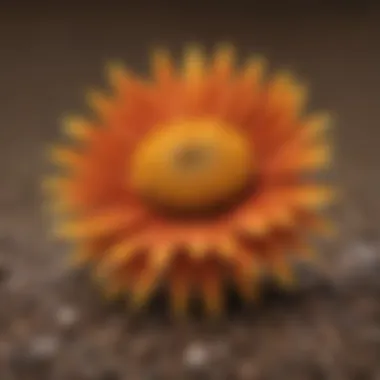
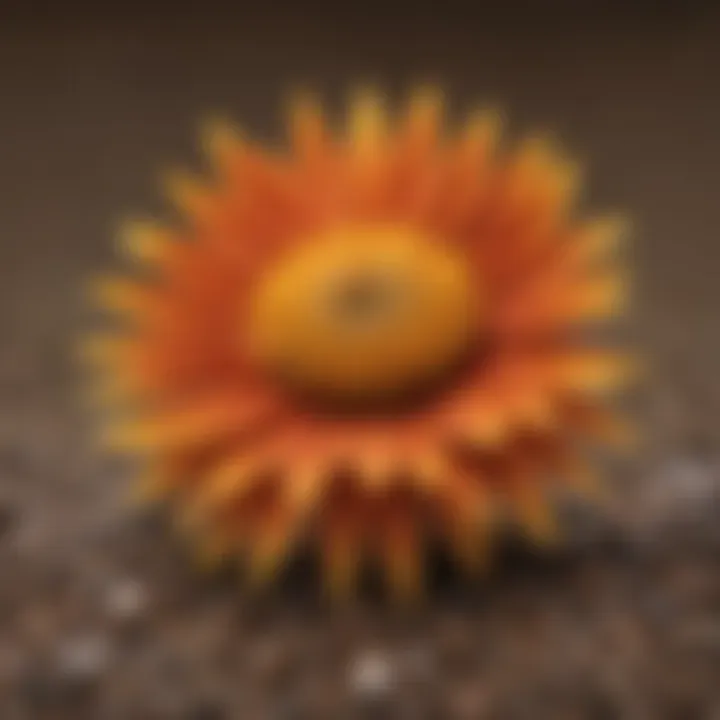
Vitamins and Minerals in Sunflower Seeds
Sunflower seeds are often touted as a powerhouse of nutritional benefits. They are rich in several key vitamins and minerals, making them a desirable food choice for many bird species. A few of these notable nutrients include:
- Vitamin E: This antioxidant is essential for maintaining cellular health. It helps protect bird’s cells from damage and supports a strong immune system.
- Vitamin B1 (Thiamine): Important for energy metabolism, it aids in the proper functioning of the nervous system.
- Magnesium: This mineral plays a crucial role in muscle function and nerve transmission, indispensable for energetic birds.
- Selenium: A trace element that acts as an antioxidant; it can usher in improved immunity and reproduction in birds.
The varied nutrient content not only supports daily activities but also promotes long-term health for your birds. Thus, offering sunflower seeds in moderation can be a smart move, ensuring your pet enjoys the benefits of these vitamins and minerals.
Nutritional Value of Safflower Seeds
On the other hand, safflower seeds shouldn't be overlooked. While they may not have the same glamour as sunflower seeds, safflower seeds possess their own unique nutritional profile. Here are some aspects to consider:
- Higher Oil Content: Safflower seeds contain a greater percentage of healthy fats, making them energy-dense. This can be particularly beneficial during colder months when birds require more energy to maintain body warmth.
- Rich in Linoleic Acid: An essential fatty acid, linoleic acid is vital for maintaining skin and feather health. Adequate intake can lead to better plumage and overall appearance.
- Good Source of Protein: Safflower seeds offer a solid boost of protein, contributing to muscle health and growth in birds.
Similarly to sunflower seeds, safflower seeds can contribute significantly to a bird's diet and should be included periodically for a balanced intake of nutrients.
Comparative Analysis of Nutritional Content
When we stack sunflower seeds against safflower seeds side by side, some differences become evident. These distinctions are significant for pet owners trying to tailor the best diet for their birds:
- Fat Composition: Sunflower seeds typically contain about 5–7% more fat than safflower seeds, primarily because of their larger kernel size. This can affect how satiety is achieved in birds, influencing their feeding habits.
- Vitamin Variances: While both seeds are rich in nutrients, sunflower seeds offer higher Vitamin E, whereas safflower seeds have a more balanced ratio of omega-3 to omega-6 fatty acids.
- Caloric Density: Sunflower seeds tend to be more caloric than safflower ones. This is an important consideration if managing a bird's weight is a concern, especially for species prone to obesity.
Considering these variables allows bird owners to make informed decisions. Ultimately, integrating both types of seeds in moderation can lead to a diverse and nutritious diet, paving the way for healthy and happy birds.
"Nutrition is an essential cornerstone in your pet bird's health. It’s not just about what they eat, but how those foods impact their lives."
By understanding the features of sunflower and safflower seeds, pet bird owners can adopt a balanced feeding strategy that prioritizes the health and vitality of their avian companions.
Health Benefits for Birds
When it comes to keeping our avian friends in tip-top shape, understanding the health benefits of sunflower and safflower seeds is absolutely vital. These seeds don’t just serve as tasty snacks; they offer various nutritional components that play a significant role in the overall well-being of birds. Below, we dig into specific health aspects linked to these seeds, highlighting how they contribute to feather health, digestive wellness, and energy requirements.
Role in Feather Health
Feathers are not only essential for birds to fly and stay warm; they also serve as a protective layer against the elements. Sunflower and safflower seeds are packed with essential fatty acids, particularly omega-6 fatty acids, that can significantly improve feather quality. Feeding these seeds can lead to shinier, healthier feathers that are less prone to damage. Bird owners might notice a marked difference; feathers that are well-nourished tend to be softer and more vibrant.
Furthermore, maintaining good feather health is crucial during molting periods. Birds often require additional nutrients during this time, and incorporating sunflower and safflower seeds into their diets can provide that needed boost. Birds will appreciate the benefits, and observers will be struck by the radiant plumage.
Support for Digestive Health
A bird’s digestive system is incredibly intricate and needs balanced nutrition to function effectively. Sunflower seeds, particularly the hearts, are a great source of fiber. Not only does this fiber aid in digestion by helping to prevent constipation, but it also supports the overall gut health of birds. Additionally, the fatty acids found in safflower seeds can help to lubricate the digestive tract.
Incorporating these seeds into a bird’s diet could lead to fewer gastrointestinal issues and a happier bird. It’s vital to monitor how well your birds take to these seeds; changes in droppings can provide some insight into their digestive health. If a bird seems overly gassy or has irregular bowel movements, you may want to adjust the seed ratios in its diet.
Boosting Energy Levels
Birds lead active lives, often requiring substantial energy throughout the day for flying, foraging, and other essential activities. Sunflower seeds are rich in calories—roughly 50-60 calories per tablespoon—which can provide an excellent energy source for both pet birds and their wild counterparts. The high-energy content of these seeds makes them particularly beneficial during breeding seasons or colder months when birds expend more energy.
Safflower seeds also contribute to energy levels, albeit with slightly fewer calories. However, they have their advantages, including a unique fat composition that promotes sustained energy release. For bird owners, it’s crucial to maintain a balance. Too few calories might leave a bird lethargic while too many could lead to obesity. Paying attention to the amount and frequency of seed feeding is essential in ensuring optimal energy levels without negative consequences.
"A well-fed bird is a happy one, leading to a stronger bond between the pet owner and its feathery friend."
Feeding Guidelines
Feeding guidelines are essential for any bird owner looking to provide a balanced and nutritious diet for their feathered friends. The right amount and frequency of sunflower and safflower seeds can greatly impact the health, energy levels, and overall well-being of birds. Understanding these guidelines not only helps in preventing obesity and nutritional deficiencies but also ensures a stable and enriching eating routine for domestic birds.
How Much to Feed
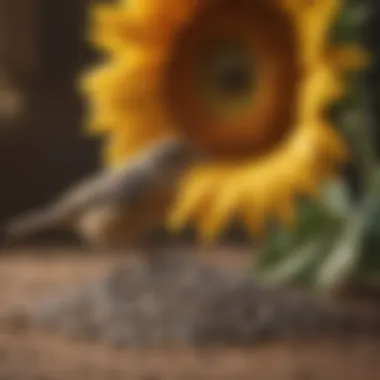
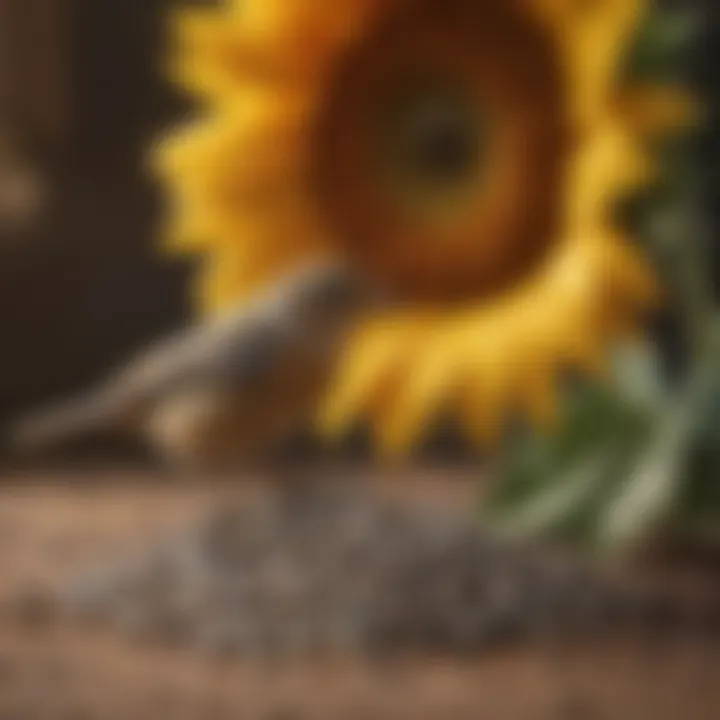
Determining how much to feed your birds can vary based on species, size, and daily activity level. Generally, a good rule of thumb is to offer seeds in moderation, about one to two tablespoons of sunflower or safflower seeds per day for smaller birds like canaries or finches. Larger birds, such as parrots, may need between three to five tablespoons.
Species-specific needs might differ, though, so keeping an eye on your bird's weight and energy can guide adjustments. Over time, most bird owners get to know their pet’s individual habits and preferences. A careful balance is key here - enough to keep them satisfied but not so much that it leads to overindulgence.
Frequency of Feeding
How often you scatter these seeds can also play a pivotal role. Ideally, seeds should be available daily, but you might consider offering a fresh serving every couple of days. If you notice that your birds are leaving excess seeds behind, you might get away with feeding them less often, but keep an eye on the freshness. Seeds can spoil quickly, leading to potential health risks for birds. So, always check the seeds before serving them.
"Fresh seeds are the heart of a bird's diet; stale seeds are just like eating yesterday's dinner – hardly appetizing!"
Combination with Other Foods
Incorporating sunflower and safflower seeds with other food items can provide a more rounded diet for your birds. Mixing in fresh fruits and vegetables can introduce necessary vitamins and minerals, while pellets can help meet other nutritional needs. For instance, try blending sunflower seeds with leafy greens like kale or dandelion for a nutritious boost.
When combining these seeds with other food sources:
- Fruits: Slice apples, bananas, or berries into bite-sized pieces.
- Vegetables: Carrots, zucchini, and bell peppers can be finely chopped.
- Pellets: Ensure these are free from artificial additives and suited to your bird’s species.
This combination not only makes meals more enticing but also supports a balanced diet overall. A varied menu keeps things interesting for the birds, while also providing essential nutrients to support their long-term health.
Differences Between Sunflower and Safflower Seeds
Understanding the differences between sunflower and safflower seeds is more than just an academic exercise for those of us who care for our feathered companions. It’s critical for ensuring that birds get what they need for optimal health. Not all seeds are created equal, and these two, while similar in some regards, cater to varying nutritional needs and preferences among bird species. This section will explore those distinctions, touching on aspects like flavor, caloric content, and which bird species favor which type of seed.
Taste and Texture Variations
When it comes to taste and texture, sunflower seeds are a bit of a crowd pleaser. They have a rich nutty flavor, and their crunchy texture makes them quite palatable. Birds often enjoy cracking open the hard shell to reach the fatty kernel inside. This is not only fun for them but is also a natural behavior that they would engage in if they were foraging in the wild.
On the other hand, safflower seeds have a more subtle taste compared to their sunflower cousins. They come with a thinner shell, so birds can access the seed more easily. The flavor is somewhat less appealing to certain bird species; however, many birds, particularly those with a picky palate like finches, can grow quite fond of them. If you're trying to attract specific types of birds to your backyard, trying out safflower seeds might pay off.
Some bird owners even report their birds preferring safflower seeds for a quieter eating experience since the shells produce less noise when cracked open.
Caloric Differences
On the caloric front, sunflower seeds pack a more substantial punch. They are rich in fats, particularly healthy unsaturated fats, which provide birds with ample energy. A standard serving of sunflower seeds can yield about 50 to 80 calories, depending on whether it’s the black oil type or the striped variety. This high caloric content makes sunflower seeds an easy go-to for birds, especially during periods of high energy expenditure such as mating season or migration.
In contrast, safflower seeds generally offer fewer calories—about 36 to 40 calories per serving. While this may seem low for some birds, they can serve as a healthy alternative, providing essential nutrients without overly heavy caloric intake. This makes safflower seeds an appropriate choice for birds that may need to watch their weight, such as those prone to obesity or those that don’t engage in extensive flight.
Attractiveness to Different Bird Species
Different bird species demonstrate varying preferences when it comes to sunflower and safflower seeds, dictated largely by their foraging habits and nutritional needs. Sunflower seeds are generally a hit among a wide range of birds, including cardinals, blue jays, and chickadees. Their robust flavor and high fat content attract birds that appreciate a good energy source.
However, some birds that often get overlooked may prefer safflower seeds. For instance, many doves and sparrows show a distinct liking for them, typically feeding with enthusiasm. Even some of the less common avian visitors, like grosbeaks, may choose safflower seeds over others, especially if sunflower offerings seem to dwindle.
Birds like jays and grackles tend to favor sunflower seeds due to their higher calorie content. Conversely, safflower seeds might not attract them as effectively, resulting in less competition at your feeder and ensuring that the smaller, quieter species have a chance to dine in relative peace.
Understanding these differences can shape your feeding strategy, guiding you to select seeds based on the avian visitors you wish to attract or the specific health needs of your pet birds.
Potential Risks and Considerations
When it comes to feeding sunflower and safflower seeds to birds, it’s vital to recognize the potential risks and considerations associated with these seeds. While they are often deemed nutritious and beneficial for avian diets, there are specific elements that every bird owner should keep in mind. By being aware of these factors, pet bird owners, aspiring bird parents, and bird breeders can ensure a healthy feeding regimen for their feathered companions.
Overfeeding Concerns
One of the primary concerns with sunflower and safflower seeds is the risk of overfeeding. Both types of seeds are high in fat. While some fat is necessary for birds, excessive intake can lead to obesity, which can cause a plethora of health issues.
"Just like humans, too much of a good thing can be detrimental for our feathered friends."
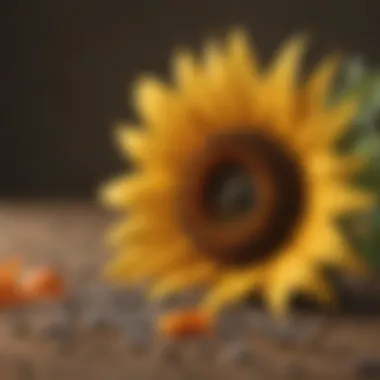
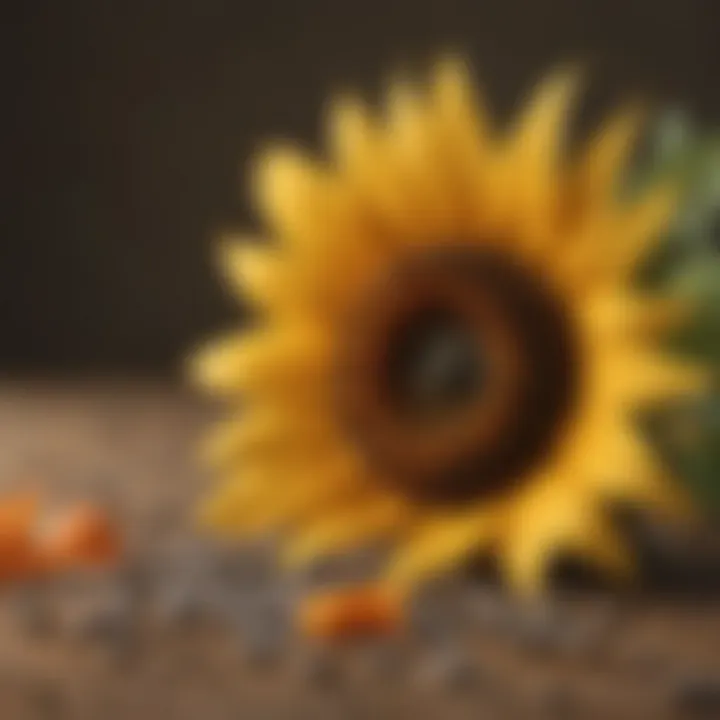
Birds that are overweight may also face challenges with mobility and be at a higher risk for diseases such as diabetes. To avoid this pitfall, it’s essential to establish a balanced diet. Seed mixtures can be helpful, but should be served in moderation. A suggested approach is to provide these seeds as treats rather than the primary diet.
- Monitor Weight: Regularly weigh your birds to ensure they’re maintaining a healthy size.
- Diverse Diet: Incorporate fruits and vegetables alongside seeds for well-rounded nutrition.
- Scheduled Feeding: Set specific feeding times to create a routine that can help manage portion sizes.
Allergies and Sensitivities
Allergic reactions or sensitivities to certain seeds can occur in birds, although they are not overly common. Sunflower seeds, in particular, can sometimes lead to issues, particularly if birds are exposed consistently.
While avian allergies can be somewhat tricky to diagnose, an owner might notice symptoms such as feather plucking, itching, or digestive problems in their birds. If any unusual behavior is observed, it may be beneficial to eliminate these seeds from their diet temporarily to see if there’s any improvement.
- Be Observant: Keep an eye on your birds to notice any changes in their behavior or health.
- Consult a Vet: If issues persist, consulting an avian veterinarian is a wise step to assess the root causes and explore alternatives.
Proper Storage of Seeds
Storage of sunflower and safflower seeds is another vital aspect that shouldn’t be overlooked. Improperly stored seeds can attract pests or spoil, rendering them unsuitable for consumption. Storing these seeds in a cool, dry place, away from direct sunlight, will help ensure their freshness.
It’s also crucial to use airtight containers to prevent moisture and pests from getting in. Regularly check your seed supply for any signs of spoilage, such as unwanted odors or a change in texture.
- Use Airtight Containers: Glass or food-safe plastic containers work best for long-term storage.
- Keep Away from Heat: Avoid placing seeds in warm areas, as heat can accelerate the spoilage process.
- Regular Rotation: Practice the FIFO (first in, first out) method to keep track of your seeds and ensure older seeds are used first.
By understanding these potential risks and considerations, bird owners can provide their pets with a diverse and healthy diet, while avoiding common pitfalls. Awareness and vigilance will go a long way in fostering a robust feeding strategy for both sunflower and safflower seeds.
Practical Tips for Seed Selection
Selecting the right seeds for your avian companions might feel like searching for a needle in a haystack. Yet, when it comes to sunflower and safflower seeds, a few practical tips can make a world of difference. The seeds you choose not only impact the birds' health but also their enjoyment during feeding time. Therefore, it’s paramount to focus on quality, origin, and the specific needs of your feathered friends.
Choosing Quality Seeds
When it comes down to it, quality truly matters. Opting for high-quality seeds ensures that your birds receive the nutrients they most definitely need. Here are a few factors to keep in mind:
- Freshness is Key: Always choose seeds that are fresh. Stale or old seeds may lose nutritional value and could even harbor pests. Checking expiration dates isn’t just a good practice; it's essential.
- Visual Inspection: Take a good look at the seeds. Quality sunflower seeds should be plump and firm, while safflower seeds should be vibrant with a smooth surface. If you notice any signs of mold or damage, it's best to steer clear.
- Source Matters: Find a reputable supplier. Sometimes, local co-ops or specialized pet stores may carry fresher, higher-quality seeds compared to generic brands found in supermarkets. It's worth checking customer reviews to ensure reliability.
In choosing quality seeds, one must also consider the additives often found in commercial blends. Seeds treated with additives can sometimes lead to health issues in birds. Hence, picking seeds that are as natural as possible is a wise choice.
Organic vs. Conventional Seeds
The debate between organic and conventional seeds isn’t just for the humans in the home. Birds, too, benefit from organic options. Here’s why you might want to give organic seeds a shot:
- No Chemicals: Organic seeds are cultivated without the use of synthetic pesticides or fertilizers. For birds, especially those prone to health issues, this means a lower risk of exposure to harmful chemicals.
- Better Nutrition: Some studies suggest that organic crops often contain higher levels of certain nutrients. While this might not always translate directly to seeds, choosing organic can be beneficial if you want to ensure your birds are getting the best possible food.
- Support Sustainable Practices: By opting for organic seeds, you contribute to farming methods that respect the environment. With fewer chemicals used, organic farming supports healthier ecosystems, which, in turn, could contribute to healthier birds.
On the flip side, conventional seeds might be easier on your pocketbook and are often readily available. However, if you can swing it, the benefits of organic seeds might outweigh the cost.
"The seeds you feed are the seeds you grow into strong, vibrant birds. Make each choice wisely."
Selecting the right seeds for your birds may require effort, but the payoff is worth it. A well-fed bird is a happy bird, and understanding these practical tips can steer you in the right direction. Keep your eyes peeled for quality, consider organic when possible, and always assess the specific needs of your avian friends.
Epilogue
The significance of appreciating sunflower and safflower seeds in the context of avian care cannot be overstated. As both provide essential nutrients, serving as comforting staples in the diets of many pet birds, they hold a special place in promoting feather health, energy, and overall well-being. Recognizing their individual qualities not only aids pet bird owners but also empowers aspiring bird parents and breeders to make informed choices.
Summarizing Key Points
In summary, the journey through the realms of sunflower and safflower seeds offers a wealth of knowledge:
- Nutritional Content: Sunflower seeds thrive in providing healthy fats, while safflower seeds shine with protein and lower-fat levels, balancing the dietary needs of different bird species.
- Health Benefits: Both seeds support feather health, enhance energy levels, and promote digestive wellness, critical facets in the upkeep of vibrant and lively birds.
- Feeding Guidelines: Knowing the appropriate quantities and combinations with other feed can cultivate better feeding practices.
- Potential Risks: Awareness regarding overfeeding and possible allergies is paramount for maintaining a safe feeding environment for birds.
- Seed Selection: Choosing the right seeds, whether organic or conventional, can directly affect birds' health.
By considering how sunflower and safflower seeds fit into a broader diet, pet bird caregivers can significantly enhance their birds' lives. These seeds serve not only as food but as vehicles for health and a stronger bond between birds and their owners.
The Role of Seeds in Bird Care
Seeds stand at the cornerstone of avian diets, often overshadowed by more elaborate meals but undeniably essential. Sunflower and safflower seeds are crucial components that deliver key nutrients; they manifest an undeniable joy for birds as they engage in natural foraging behaviors.
By incorporating these seeds, bird owners can cater to their pets' instincts, promoting not just nutrition but also stimulation. The crunchiness of sunflower seeds or the distinct flavor of safflower seeds can bring forth excitement, keeping playtime lively and enjoyable.
Recognizable as foundational elements, these seeds also create spaces for nurturing relationships between owners and their birds. Each offering is less about mere nutrition and more about care, dedicated time, and affection, fostering connections that enhance the bird-keeping experience. When one pours effort into selecting the right seeds, they contribute significantly to their birds' happiness and vitality. In the long run, enriched with knowledge, each caregiver can craft a well-rounded, fulfilling dietary routine that echoes uniqueness across individual species.















